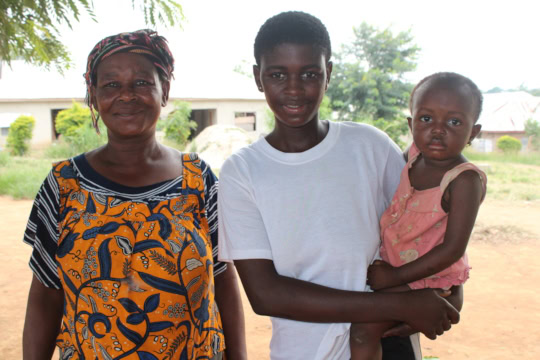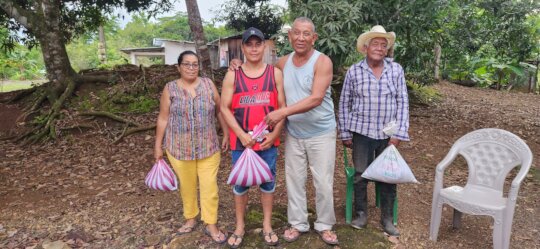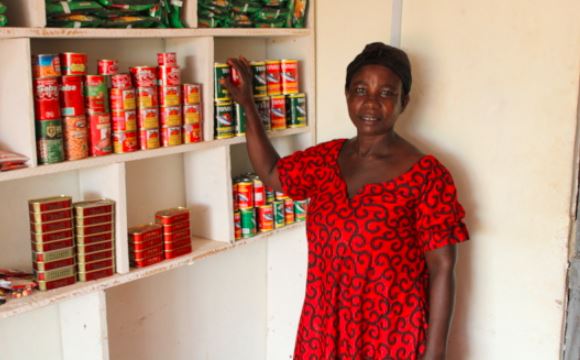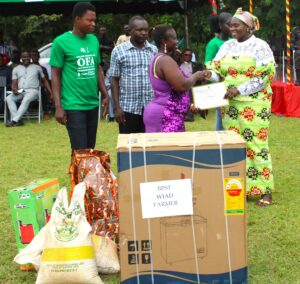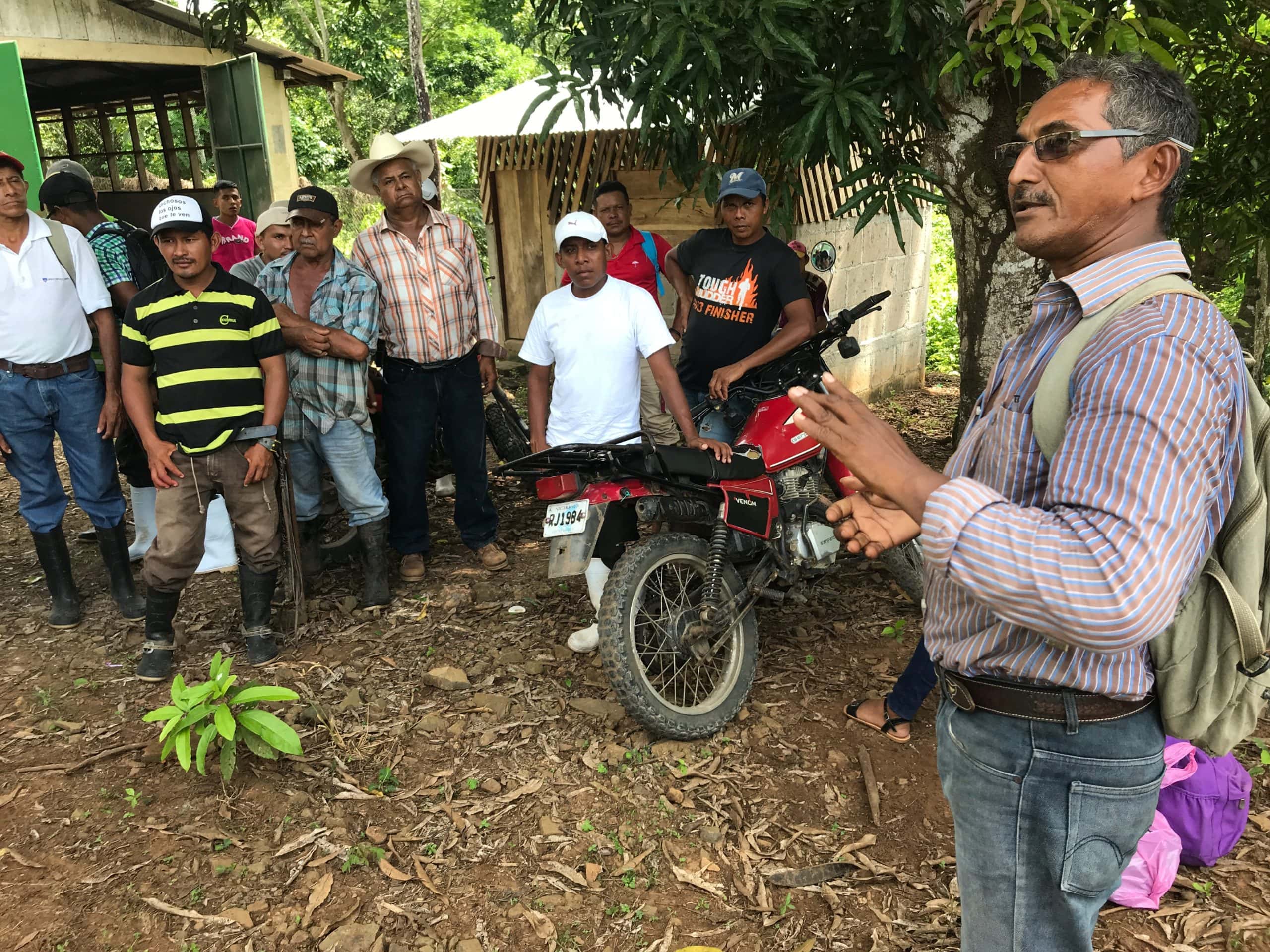
Community Leaders are the Strongest Agents for Change
This report was written by Latin America Program Specialist, Katie Seifert, following her October 2019 trip to Nicaragua.
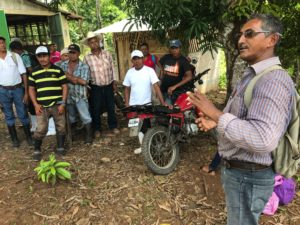
Los Chiles Coop leader, Isidro, talking to farmers.
The Self-Help International Nicaragua staff have always “trained the trainer,” even if they haven’t called it that. Each program officer knows to identify community leaders across the country, and these leaders help attract their peers to Self-Help’s programs. Plus, leaders who know our programs help educate their own neighbors and community members on things like bettering water quality and sanitation, improving businesses, and innovating agricultural practices.
In 2010, Self-Help began working with farmers from the Los Chiles community who were learning maize seed reproduction by way of Self-Help’s agriculture program. Four years later, these seed producers founded the Los Chiles Cooperative, which would supply loans to small-holder farmers so that they could access inputs prior to planting season and repay the cooperative post-harvest. A key input the cooperative supplied was quality protein maize seed (QPM) – the very seed these farming leaders had learned to reproduce. But, the cooperative’s operation has remained small these past five years, making it harder to access sufficient funding through traditional avenues. As a result, Self-Help has supplied periodic agricultural loans to the cooperative, so that its members can access the supplies they need to farm Los Chiles’ QPM.
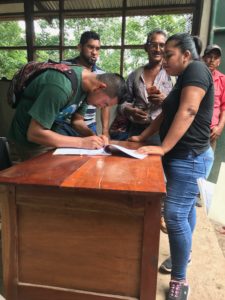
Handing out the inputs.
Nicaragua Country Director, Jorge Campos, and Program Operations Manager, Lucia Vega, have long dreamt of expanding Self-Help’s reach by way of agricultural loans. This year, with the dedicated work of new Agriculture Program Officer Rodolfo Hernandez, the Self-Help team managed to reach 59 new small-holder farmers by way of the training-the-trainer method. Rodolfo cultivated relationships with farming community leaders across four different communities: Nueva Armenia, Ojo de Agua, San Agustin, and Las Minas. These “expert” farmers, who are well respected in their communities, have good relationships with Self-Help and employ our improved farming techniques.
In the second maize planting season (October 2019), these community leaders joined Self-Help and the Los Chiles Cooperative in an expansion of our training-the-trainer practice. SHI provided loans to the cooperative and the community leaders in order to secure sufficient agriculture inputs for the 59 farmers. On average, SHI loaned approximately $238 USD worth of inputs to each of the farmers, who will plant using the methods taught to them by their community leaders. They are expected to repay in full after April 2020’s harvest.
I had the privilege of being at the cooperative the day the agricultural inputs were distributed to the farmers. We arrived at Los Chiles early and already dozens of farmers were milling about, eagerly awaiting their supplies. Some had arrived on horseback, and a slew of horses were tied to trees outside the large building. Most came together on a bus, per the instructions of their community leader. The energy was palpable, and the operation was even more organized than I’d expected. Each farmer had a specific amount he or she would receive and signed for their loan once the repayment process had been explained to them. Names and communities were clearly labeled on each product, then loaded into the bus.
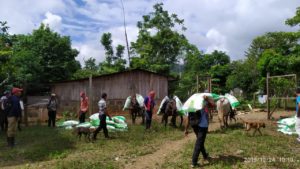
Farmers collecting the inputs.
We made sure to share a few words with the farmers under the shade of a mango tree just outside the building. I was so pleased to see the local leaders take the floor to talk to the other farmers. They explained the importance of the loans and repayments. They reminded everyone that inputs were being provided so that farmers would employ our improved farming techniques for higher yields and less fertilizers needed. Additionally, they shared how working with Self-Help had impacted their lives Their increased crop yields meant more food and income to share with their families. I loved hearing from these farming leaders because, as the staff pointed out to me, the farmers’ words mean more to their peers than our words as Self-Help staff ever can. It was inspiring, and I also realized that these loans meant that the QPM the cooperative produced would stay within the region. Self-Help can be assured that local farmers have access to a high-quality product that we know to be healthier for communities.

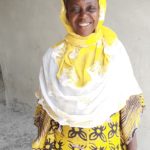 Previous Post
Previous Post Next Post
Next Post